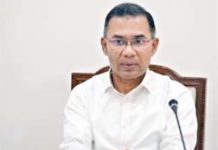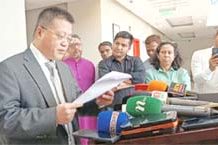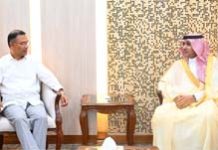C T Online Desk: The treatment cost of dengue added woes to the people who were already struggling to manage their livelihoods due to the rise in prices of essential commodities.
Most of the money on dengue treatment is usually spent on laboratory tests, but some private hospitals are also allegedly prescribing unnecessary medicines, even though physicians place more importance on patient management than medication.
The treatment cost of dengue patients having no other health complications ranges from Tk 7,000 to Tk 70,000 depending on the hospitals.
Elin Ahmed, a resident of Narayanganj, who spent seven days from October 20 to October 26 at Samorita Hospital Limited, had to pay Tk 61,704, including Tk 26,600 in bed rent, Tk 13,600 in endoscopy and other test fees, and Tk 11,394 in medicine costs.
Elin’s younger brother, Kamruzzaman Rahat, told New Age that he had no other health complications and did not require albumin or platelets.
He said that a vitamin prescribed for him costs them over Tk 5,000.
At least seven more people died of dengue and 875 were hospitalised in the past 24 hours across the country, bringing the total death toll from the disease to 177 since January.
A total of 43,982 people were hospitalised with dengue during the period, according to the Director General of Health Services.
Of the new deceased, six were reported in Dhaka and one in Chattogram.
DMCH principal Md Titu Miah told New Age that there was no chance of medicine costs reaching Tk 11,000 unless a patient required albumin.
He said that an endoscopy was usually not required for a dengue patient.
Samorita Hospital general manager Nurul Islam said that a patient required around Tk 60,000 for seven-day stay in a Tk 3,000-bed.
A family member of a dengue patient, who spent seven days at Holy Family Red Crescent Medical College, said that they had to pay Tk 51,000 as hospital bill.
Public health expert Rashid-e-Mahbub, also a former president of the Bangladesh Medical Association, said that dengue treatment costs have become unaffordable for people in the lower and lower-middle-income groups.
‘The government could not create a safety net in the health sector. The dengue treatment costs forced many people from the lower middle-income group into paupers to shoulder a huge loan burden,’ he said.
He said that there was no alternative to the government stepping in to help such people.
A total of 29,248 patients or 66.50 per cent of this year’s total hospitalisation were reported in Dhaka.
A total of 3,270 dengue patients are now undergoing treatment at health facilities across the country, a DGHS release said.
Md Monir, a CNG driver, living in the capital’s Khilgaon area, spent seven days in Dhaka Community Hospital from October 29 to November 6 and had to pay Tk 6,420.
Of the total hospital bill, Tk 5,090 or 79.28 per cent was for tests.
He had to check his Complete Blood Count (CBC) nine times, each costing Tk 300.
Despite spending a relatively low amount for his treatment, Monir said it made life tougher for his four-member family.
‘I could not work while I was in the hospital. Consequently, my family has suffered as I am the only earning member in my family,’ Monir said.
DCH floor supervisor Bipul Jyoti Kundu said that they charged patients only Tk 100 as bed rent per day.
‘The cost usually goes up if the patient requires plasma, as one bag of plasma requires Tk 5, 000,’ he said.
CBC tests are regularly conducted for dengue patients, with private hospitals charging Tk 400 every time. DCH charged Tk 300 for each CBC test, and Dhaka Medical College Hospital charged Tk 150.
A total of 5,958 people were hospitalised and 36 died in the first seven days of November.
Dengue cases usually start rising in July and come down in October.
The infection rose due to climate change, lack of hotspot management, and people’s unawareness, said Jahangirnagar University zoology professor and vector management expert Kabirul Bashar.
Sahara Khatun Champa, a resident of Shibpur in the Narsingdi district, was found lying on the DMCH floor on Sunday.
‘My husband died of liver cancer last Sunday. I tested dengue positive on Tuesday. Narsingdi Sadar Hospital authorities referred me here as my condition deteriorated.
Champa said that she had already spent Tk 22,000 for her treatment, which included transportation, medicine, and food.
‘I took the entire amount as a loan from my relatives. My husband could not work in the past six months due to his illness,’ she said, adding that her two sons are still students.
Unemployed Mohammad Soheb Parvez, 44, a resident at Kalagachia in Narayanganj, was also found lying on the DMCH floor on Sunday.
Soheb said that he rushed to DMCH on Saturday after a test at the Popular Diagnostic Centre in Narayanganj found him dengue positive on Thursday.
‘I have spent Tk 5,000 in Popular and another Tk 5,000 here in two days,’ he said.
He said that he had been struggling to cope with the price of essentials since returning from Saudi Arabia in August 2021.
‘I get Tk 18,000 renting my house. I have no other income. The treatment cost put an extra burden on me,’ he said.
Health minister Zahid Maleque said on Sunday that the NS-1 antigen test to identify dengue would cost Tk 100 at government hospitals and Tk 300 at private hospitals from now.
In 2019, during the worst-ever outbreak, dengue test was made free in government facilities.
DMCH was found charging Tk 100 for a dengue test, but the private hospitals were yet to follow the instruction.
Popular Diagnostic Centre assistant general manager Achinto Kumar Nag told New Age that they were yet to receive any formal order from the government.
The diagnostic centre was found to be charging Tk 500 for dengue tests.
DGHS director general ABM Khurshid Alam and additional director general Ahmedul Kabir were unavailable for comments.















